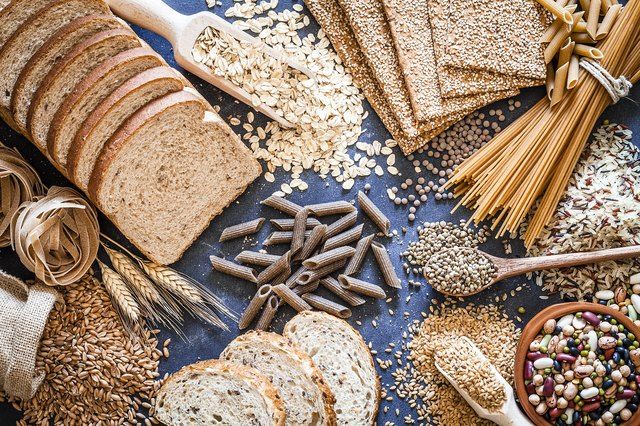Which Grains Are Low in Carbs? 9 Good Choices ( Part 1)
High fiber grains, including quinoa and oats, can reduce the number of carbohydrates your body absorbs. They can also provide other key nutrients. Read on for more good options.
Grains are often completely off-limits on many low carb diets.
However, several types of grains are high in fiber. This means you can enjoy them in moderation as part of a healthy, carb-controlled diet.
Foods that are high in fiber contain a lower number of net carbs, which is the number of carbs the body absorbs. You can calculate net carbs by subtracting the grams of fiber from the total grams of carbs.
Here are some of the top grains that are low in carbs, plus a few others that you may want to limit on a low carb diet.

Oats are highly nutritious. They are a great source of many important nutrients, including fiber.
A cup of cooked oatsTrusted Source contains around 4 grams of dietary fiber and around 23 grams of net carbs.
Oats are also rich in beta-glucan. This is a type of fiber that research has shown to reduce levels of LDL cholesterol. According to researchers, high levels of LDL cholesterol are a risk factor for heart disease.
Oats are also a great source of several other micronutrients, including manganese, phosphorus, magnesium, and thiamine.
Select steel cut or rolled oats instead of highly processed varieties, such as instant oatmeal.
A 1 cup (33 gram) serving of cooked oats contains 23 grams of net carbs. Oats are also high in beta-glucan, a type of fiber that may help lower levels of LDL (bad) cholesterol.

Quinoa
Although technically classified as a pseudocereal, quinoa is often prepared and enjoyed as a grain.
Quinoa is loaded with beneficial antioxidants and polyphenols. According to researchersTrusted Source, these properties can help decrease inflammation and protect against chronic disease.
It’s relatively low in carbs, with around 34 grams of net carbs in each 1 cup (185 gram) serving of cooked quinoaTrusted Source.
ResearchersTrusted Source have also found that quinoa is also one of the few plant-based complete protein sources. This means that it contains all nine of the essential amino acids the body needs to obtain from food sources.
Additionally, quinoa is high in other key nutrients, including manganese, magnesium, phosphorus, copper, and folate.
Quinoa contains 34 grams of net carbs per cooked cup (185 grams). It’s also high in antioxidants and contains all nine of the essential amino acids that your body needs.
Bulgur is a type of cereal grain typically made from cracked wheat berries.
You can use it in a variety of dishes, including tabbouleh salad, porridge, and pilaf.
Not only is bulgur versatile and easy to prepare, but it’s also highly nutritious.
In particular, it’s a great source of manganese, iron, magnesium, and B vitamins.
A cup (182 grams) of cooked bulgurTrusted Source contains 26 grams of carbs and over 8 grams of fiber.

One cup (182 grams) of cooked bulgur contains 26 grams of net carbs. Bulgur is also versatile, easy to prepare, and rich in manganese, iron, magnesium, and B vitamins.

Millet is a type of ancient grain that’s cultivated around the world.
Like other whole grains, millet is high in antioxidants and polyphenols. According to researchers, this may help prevent chronic conditions like type 2 diabetes.
Millet is also a good source of fiber and relatively low in net carbs, making it a great addition to a healthy, low carb diet. A 1 cup (174 gram) serving of cooked milletTrusted Source contains over 2 grams of fiber and 39 grams of net carbs.
Millet is also high in a variety of other vitamins and minerals, including phosphorus, calcium, magnesium, and folate.
Millet contains 39 grams of net carbs per cooked cup (174 grams). It’s also high in phosphorus, calcium, magnesium, and folate.

Couscous is a processed grain product that’s typically made from semolina flour or durum wheat.
A staple in many Middle Eastern and Moroccan dishes, couscous is relatively low in carbs. It contains around 35 grams of net carbs and 2 grams of fiber in each 1 cup (157 gram) serving of cooked couscousTrusted Source.
Couscous is also packed with selenium. According to researchers, selenium is a trace mineral that plays a crucial role in heart health, thyroid function, immune health, and more.
Adding couscous to your diet can also boost your intake of several other important micronutrients, including pantothenic acid, manganese, copper, and thiamine.
Couscous is a grain product with 35 grams of net carbs per cooked cup (157 grams). In addition to providing plenty of selenium, couscous is high in pantothenic acid, manganese, copper, and thiamine.

